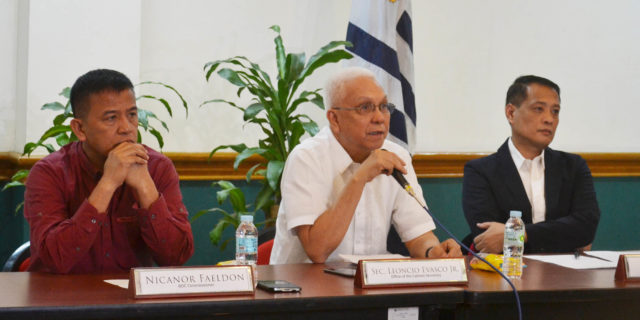
An inter-agency task force that includes the National Food Authority (NFA) and Bureau of Customs (BOC) has been created to prevent rice smuggling in the Philippines.
Cabinet Secretary Leoncio Evasco, Jr in a media briefing on January 18 said his office had called the two agencies to an emergency meeting to discuss mechanisms to ensure zero smuggling, consistent with President Rodrigo Duterte’s directives.
NFA is one of 12 agencies placed under the Office of the Cabinet Secretary under Executive Order No. 1 issued last year.
Under Republic Act (R.A.) No. 10845, or the Anti-Agricultural Smuggling Act of 2016, rice smuggling is a form of economic sabotage if the illegal importation reaches a fair market value of P10 million.
Evasco said the inter-agency committee is needed “since we still have unscrupulous traders who have already mastered circumventing the law and would do misdeclaration, misclassification, and over-landing of rice; acts which are extremely detrimental to our impoverished citizens and rice farmers.”
He explained rice smuggling distorts the local price of rice, bloats the domestic supply, and puts citizens and farmers “in an extremely disadvantageous situation.”
The Cabinet official said creating a task force at this particular time is crucial since private sector-led rice importation has already commenced and is expected to last until February 28.
The inter-agency committee, he noted, is determined to strictly implement R.A. No. 10845, which states that an import permit is needed before rice can be imported. Evasco said imported rice previously was allowed to enter the country even if the permits were still being processed.
The Cabinet official said the group also agreed to allow only up to 2% over-landing of rice load as allowance for potential breakage and damages, as opposed to the previous practice of leaving the permitted percentage to the discretion of the regulatory agency.
Another approved measure is for the committee to study the removal of freeport zones as ports of entry for rice. Freeport zones are not under the jurisdiction of the BOC, thus usual customs laws do not apply to such areas.
With NFA under his office’s direct supervision, Evasco said he “can assure the public that a more stringent accreditation process of potential companies and cooperative traders has been employed by NFA to ensure financial and governance fitness.”
“As such, a post-qualification mechanism has been added on top of the pre-qualification standards. We have also made a conscious effort to give opportunity to new but qualified players to ensure fair competition. With that, the number of qualified traders and cooperatives issued with Certificate of Eligibility has almost doubled,” Evasco stated.
The task force also agreed to study the possibility of donating all seized rice to the Department of Social Welfare and Development to support its Pantawid Pamilya Program and to help disaster victims.
“Perhaps the government is better off with this scheme instead of auctioning it (seized rice), when in reality it is still the traders who will place bids,” Evasco said.
Customs Commissioner Nicanor Faeldon during the same press conference pointed out that under the new Customs Modernization and Tariff Act, BOC is allowed to donate seized goods.
Faeldon, meanwhile, said he expects the Department of Finance to approve the draft implementing rules and regulations of R.A. No. 10845 soon. – Text and photo by Roumina Pablo








